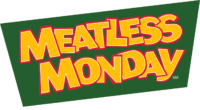The Black Chefs, Entrepreneurs, and Inventors Shaping American Cuisine
American cuisine is like a grand mosaic, splashed with a complex array of influences, ingredients, and inspirations. But, as with much of history, the contribution of some groups are lost, under appreciated, or overlooked.
In honor of Black History Month, we are celebrating the culinary influence and agricultural innovations made by Black Americans. What is even more remarkable about these achievements is that many of them were made during periods of intense racial discrimination. But despite the rampant inequality and injustice, Black Americans have—and continue—to shape cooking and food production in America.
Building on the work of previous innovators is the current generation of Black American chefs and food activists who are dedicated to promoting more plant-based cooking in their communities. By introducing healthy recipes and normalizing the concept of vegan and vegetarian cooking, these individuals are doing their part to reduce instances of chronic diseases, such as type 2 diabetes, heart disease, and obesity, that disproportionality affect Black Americans.
Let’s continue to celebrate and learn more about the diversity and contributions of Black American’s that makes our food so rich, complex, and delicious.
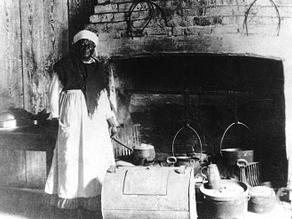

Abby Fisher
Abby Fisher published the second known cookbook by a black woman in the United States. Fisher was born into slavery in South Carolina, but she eventually made it to San Francisco, where she began manufacturing pickles. From her time in the South, Fisher learned many of the southern culinary traditions, which she included in her cookbook, What Mrs. Fisher Knows About Southern Cooking. Published in 1881, the book has recipes for classics dishes like corn fritters and okra.
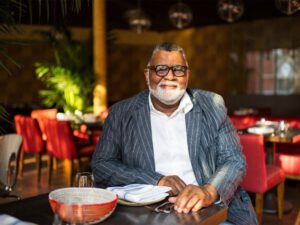

Alexander Smalls
Author, advocate, chef…opera singer? Yes, Alexander Smalls has quite the lengthy list of accomplishments, but he is most recognized as a scholar of African and Low Country cuisine. His award-winning restaurant, The Cecil, was New York City’s first Afro-Asian American restaurant, and was named “Best New Restaurant in America” by Esquire in 2014. In 2019, Mr. Smalls was the recipient of a James Beard Award for his cookbook, Between Harlem and Heaven, a collection of unique recipes focused on the Afro-Asian style of cooking. Try Alexander’s Lady Lima Succotash Salad with Fresh Mint recipe.
Follow Alexander on Instagram, Facebook, and Twitter.


Bryant Terry
A contemporary food activist, Bryant Terry is a James Beard award-winning vegan chef bringing equality to the food system through the promotion of plant-based eating in Black communities. He has published six books focused on African-inspired vegan recipes, and he is currently the chef-in-residence at the Museum of African Diaspora in San Francisco. In his latest book, Black Food, Terry explores Black food in America and around the world, it has been described, “as much a joyful celebration of Black culture as a cookbook.”
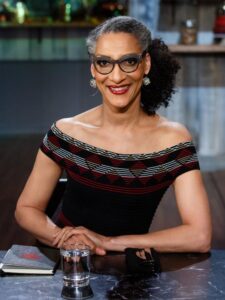

Carla Hall
Carla Hall first gained notoriety competing on Bravo’s “Top Chef” and “Top Chef: All Stars,” but audiences immediately gravitated to her positivity, spunk, and commitment to cooking from the heart — even while in a grueling competition series. Since then, she has moved beyond the kitchen, appearing as a regular host on ABC’s “The Chew,” as well as a Culinary Contributor to “Good Morning America.” Her latest cookbook, Soul Food: Everyday and Celebration, was published in 2018, landing on annual “Best Cookbook” lists across the country and receiving an NAACP Image Awards nomination. Try Carla’s Lighten Up Chickpea and Mushroom Meatball Platter recipe.
Follow Carla on Instagram, Facebook, and Twitter.
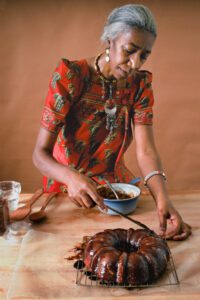

Edna Lewis
When it comes to Southern cooking, Edna Lewis is larger than life. The granddaughter of formerly enslaved people, Lewis put Southern comfort food on the map when she opened her own New York City restaurant, Café Nicholson, in 1948. Lewis was one of the few black, female head chefs in the country, but her simple, yet delicious Southern food truly wowed her restaurant’s high-profile clientele, which included Tennessee Williams, Truman Capote, and Gloria Vanderbilt. In 1972, Edna Lewis authored, The Taste of Country Cooking, which focused on pure and fresh ingredients, annual Emancipation Day picnics, and the aromas of celebratory meals. The Taste of Country Cooking ushered in a new wave of cookbooks celebrating the diversity of southern cuisine. Try Edna’s Simmered Greens with Cornmeal Dumplings or Baked Tomatoes with Crusty Bread recipes.
Follow The Edna Lewis Foundation on Instagram, Facebook, and Twitter.
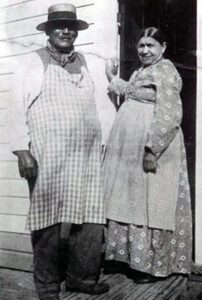

George Speck
George Speck (also known as George Crum) developed his culinary skills while cooking at Cary Moon’s Lake House for wealthy Manhattanites summering in Saratoga Springs. Eventually Speck opened his own restaurant, Crum’s, where he served only food grown locally on his farm. The high level of food and service earned Speck quite the reputation amongst his elite diners, but he is most known for being the inventor of the “Saratoga-style” potato chip, which were served as a precursor to his meals.
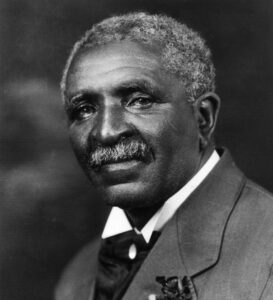

George Washington Carver
He is most famous for developing products made from peanuts, but George Washington Carver contributed much more than that to American agriculture and cuisine. As an agricultural chemist, he focused efforts on finding more than 300 new applications for Southern crops like soybeans, pecans, and sweet potatoes. Carver is also responsible for bringing crop rotation—the practice of planting different crops on the same plot of land to improve soil health—to the South. Some of the products attributed to Carver include versions of ink dye, flour, vinegar, and synthetic rubber.
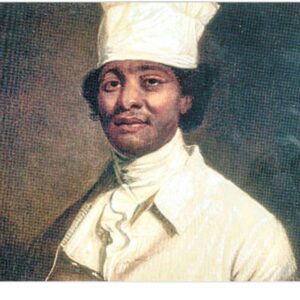

James Hemings
Born in 1765, James Hemings first served as Thomas Jefferson’s personal attendant and barber (he was enslaved, but also the half-brother of Jefferson’s wife), and he later accompanied Jefferson to Paris “for the particular purpose” of learning French cookery. Two years later, he returned with the Jefferson family to the United States, where he revolutionized dining at Monticello (Jefferson’s home) by using the then-new multi-burner stove. Hemings is responsible for introducing European-style macaroni and cheese, French fries, and crème brûlée to America. He left Monticello in 1796 as a literate, bilingual, free man.
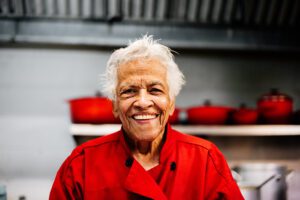

Leah Chase
Few chefs embody the spirit of Louisiana and Creole culture like Leah Chase. Often called the, “Queen of Creole Cuisine,” Chef Chase led a remarkable life that married a love for cooking and feeding with a passion for advocacy and Black empowerment. Her famed eatery, Dooky Chase’s Restaurant, opened in New Orleans in the 1940s, at a time when the city’s segregation laws prohibited customers of different skin colors from dining together. The restaurant quickly blossomed into a space where Black customers could enjoy classic Louisiana cooking, like gumbo, jambalaya, red beans, and Shrimp Clemenceau, as well as meet to discuss civil rights for African Americans. Chef Chase has many accolades, including numerous cookbooks, television appearances, and a James Beard Award. She has cooked for presidents and celebrities, and her personal story was the inspiration for Princess Tiana in Disney’s animated 2009 classic The Princess and the Frog — the first Disney movie to feature an African American princess. Try Leah’s Potato Salad recipe.
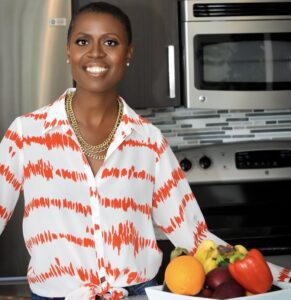

Tracye McQuirter
Tracye McQuirter is a public health nutritionist and devoted vegan. Her 34 years of plant-based eating provided her with all the insight and experience necessary to write multiple practical plant-based eating resources, including African American Vegan Starter Guide and By Any Greens Necessary, a comprehensive guide on how to eat vegan, written specifically for Black women. McQuirter announced an expanded program to help 10 million Black women go vegan, “while Black women are leaders in so many progressive ways, we are in a crisis when it comes to our health…experiencing the highest rates of heart disease, stroke, diabetes, and cancer—the top four killers and disablers in the nation.” Her work continues to be instrumental in promoting healthy eating in Black communities.
